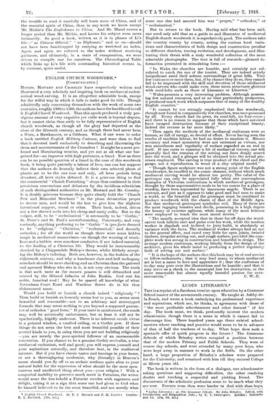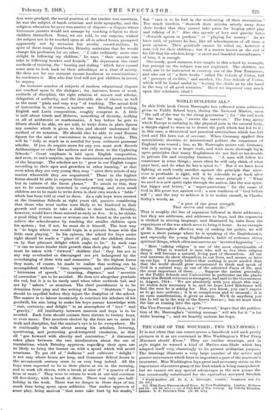LUDUS L1TERARIUS.*
Tars is a reprint of a Jacobean treatise upon education by a Grammar School master of the seventeenth century. He taught at Ashby-de- la-Zouch, and wrote a book embodying his professional experience and aspirations, which are, he thinks, in agreement with those of " the most profitable schoolmasters and other learned " of his day. The book must, we think, profoundly interest the modern educationist. though there is a sense in which it cannot fail to discourage him. Three hundred years ago there existed school-• masters whose teaching and practice would seem to be in advance of that of half the teachers of to-day. What hope does such a spectacle offer of quick progress in the future ? The Grammar Schools of which Brinsley writes occupied a position between that of the modern Primary and Public Schools. They were of course day schools, and were attended by many poor boys, who were kept away in summer to work in the fields. On the other hand, a large proportion of Brinsley's scholars were prepared for the University, and remained with him till they entered College at fifteen years old.
The book is written in the form of a dialogue, one schoolmaster asking questions and suggesting difficulties, the other resolving doubts and teaching a respectful and yielding friend. The discontents of the scholastic profession seem to be much what they are now. Parents even then were harder to deal with than boys,
• Ludas Literariut ; or, The Grammar &hook.. By John 331-Insley. Edited, with
Introduction and Biographical by B. T. Campagnac. London ; Constablo and Co. flOs. Od. nct.l fees were grudged, the social position of the teacher was uncertain, he was the subject of harsh criticism and little sympathy, and the religious education he gave was matter of dispute—a dispute whose bitterness parents would not assuage by teaching religion to their children themselves. Some, we are told, to our surprise, wished the subject not to be touched upon at all in school hours, prompted apparently not by sectarian but secular considerations. In spite of these many drawbacks, Brinsley maintains that he would change his profession for no other. I take ordinarily more true delight in following my children," he says, " than anyone can take in following hawker and hounds." He deprecates the cruel methods of training, the " beating and dulling " which have caused some men to look back on their schooldays as a time of misery. He does not for one moment excuse harshness as conscientious ; he condemns it. Men who fear God will not put children in terror, he argues. An immense number of subjects of modem educational dispute are touched upon in the dialogue ; for instance, hours of work, methods of discipline, the right relation of master and scholar, delegation of authority, and the desirable size of classes, as well as the most " plain and easy way " of teaching. The actual field of instruction is, of course, a narrow one. Reading and writing, English and Latin composition, roughly comprise it. A little is said about Greek and Hebrew, something of divinity, nothing at all of arithmetic or mathematics. A boy before he gets to fifteen should be able, we are told, to write down in plain figures any number which is given to him and should understand the method of its notation. He should also be able to read Roman figures for the sake of convenience in turning over books. This will be " fully so much as is needful for your ordinarie grammar
scholler. If you do require more for any you must seek Records
Arithmetique or other like authors and set them to the Cyphering Schoole." Great emphasis is laid upon English composition, and even, to one's surprise, upon the enunciation and pronunciation of the language. The scholars are to " grow in our English tongue according to their ages and growthes in other learning," so that even when they are very young they may " utter their minds of any matter wherewith they are acquainted." Those in the highest forms should be able to express themselves " not only in proprietie but in varietie of the finest phrase." To attain to this, they are to be constantly exercised in essay-writing, and even small children are to be made to write down in their own words a "fable " which has been told or read to them. As a rule boys were entered at the Grammar Schools at eight years old, parents considering that those who went earlier were likely to be hindered in their growth and certain to take a dislike to their books. Brinsley, however, would have them entered as early as five. It is, he thinks, a good thing if some man or woman can be found in the parish to relieve the schoolmaster by teaching the smaller children upon his system ; but if not, he must do it himself. The best way is " to begin where one would begin in a private house with the little ones playing." In his opinion, the school for boys under eight should be made a " place of play, and the children drawn on by that pleasant delight which ought to be." In such case " it can no more hinder their growth than their play cloth." Care must be taken with " forward " children that " they bee not in any way overloaded or discouraged nor yet indangered by the overcharging of their wits and memories." In the highest forms they must, of course, be made to realize that nothing can be accomplished without " time, experience, and painfulness," but " bitterness of speech," " taunting, disgrace," and " Beveritie of correction " are to be avoided. He does not altogether preclude the rod, but it is to be rarely used when other methods fail, and not by " ushers " or monitors. The chief punishment is to be detention from play and the writing of lines. " Stubborn " boys should be expelled before they injure the discipline of the school.
The master is to labour incessantly to convince his scholars of his goodwill, his aim being to make his boys pursue knowledge with " ease, certainty, and delight " in an atmosphere of " love " and " gravity." All familiarity between masters and boys is to be avoided. Each form should contain from sixteen to twenty boys, or even more.. Two monitors elected by the form are to assist in work and discipline, but the master's eye is to bo everywhere. He is continually to walk about among his scholars, lecturing, questioning, and promoting good-tempered emulation, so that all " gee forward with alacrity and contention." A discussion takes place between the two interlocutors about the use of translations, which Brinsley approves, regarding their open use as likely to bring the learner on with a speed which will avoid weariness. To get rid of " dullness " and cultivate " delight " is not easy where hours are long, and Grammar School hours in the seventeenth century seem to us very long indeed. All the boys were expected to be in their places at six in the morning, and to work till eleven, with a break at nine of " a quarter of an hour or more." They were to return to work at one and continue till five-thirty, with a break at three. There was only one half- holiday in the week. There was no danger in those days of too much time being spent upon athletics. Our author approves of some play, being anxious " that none take butt by his studio," but " care is to be had in the moderating of their recreations." Too much freedom " draweth their minder utterly away from their bookes that they cannot take pains for longing after play and talking of it." Also this apostle of love and gravity hates " clownish sports or perilous " or " playing for money." As wo have said, of parents he has, like all schoolmasters of all time, a poor opinion. Their gratitude cannot be relied on, however a man toil for their children ; but if a master knows at the end of his life that his scholars keep " a sweet and thankful remembrance " of him, it is enough.
Obviously, good manners were taught in this school by example, but precept on the subject was not neglected. The children, we read, are to be instructed in courtesy out of the New Testament, and also out of " a little booke " called The Schools of Virtue, full of precepts of civilitie," and another, The New Schools of Virtue, which will be found useful in " leading the childe as by the hand in the way of all good manners." Have we improved very much upon this scholastic ideal ?



































 Previous page
Previous page